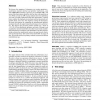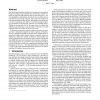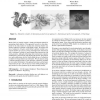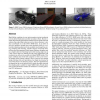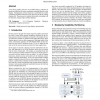105
click to vote
EGH
2009
Springer
14 years 12 months ago
2009
Springer
We discuss the mapping of elementary ray tracing operations-acceleration structure traversal and primitive intersection--onto wide SIMD/SIMT machines. Our focus is on NVIDIA GPUs,...
128
click to vote
EGH
2009
Springer
14 years 12 months ago
2009
Springer
A major factor for the efficiency of ray tracing is the use of good acceleration structures. Recently, bounding volume hierarchies (BVHs) have become the preferred acceleration st...
EGH
2009
Springer
14 years 12 months ago
2009
Springer
Current GPUs rasterize micropolygons (polygons approximately one pixel in size) inefficiently. We design and analyze the costs of three alternative data-parallel algorithms for ra...
112
click to vote
EGH
2009
Springer
14 years 12 months ago
2009
Springer
The latest generation of graphics hardware provides direct access to multisample anti-aliasing (MSAA) rendering data. By taking advantage of these existing pixel subsample values,...
120
click to vote
EGH
2009
Springer
14 years 12 months ago
2009
Springer
Ray tracing has long been considered to be superior to rasterization because its ability to trace arbitrary rays, allowing it to simulate virtually any physical light transport ef...
110
Voted
EGH
2009
Springer
14 years 12 months ago
2009
Springer
Monte Carlo ray tracing remains a simple and elegant method for generating robust shadows. This approach, however, is often hampered by the time needed to evaluate the numerous sh...
EGH
2009
Springer
14 years 12 months ago
2009
Springer
122
click to vote
EGH
2009
Springer
14 years 12 months ago
2009
Springer
High fidelity rendering via ray tracing requires tracing incoherent rays for global illumination and other secondary effects. Recent research show that the performance benefits fr...
EGH
2009
Springer
14 years 12 months ago
2009
Springer
A low-level graphics processor is assembled from a collection of hardwired functions of screen coordinates embedded directly in the display. Configuration of these functions is co...
